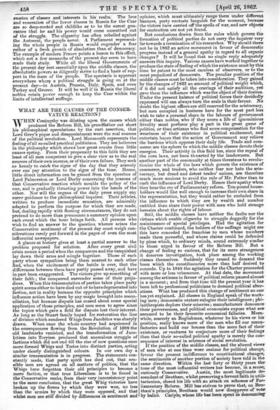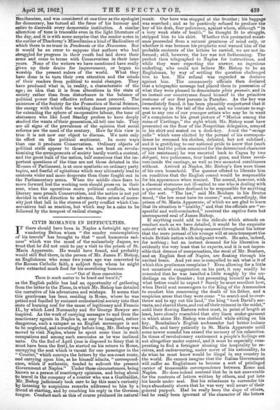WHAT ARE THE CAUSES OF THE CONSER- VATIVE REACTION ?
JHEN Coninesby was dilating upon the causes which produced the Reform Bill, his grandfather cut short his philosophical speculations by the curt assertion, that Lord Grey's pique and disappointment were the real sources of the political revolution. Lord Monmouth represents the feeling of all so-called practical politicians. They are believers in the philosophy which shows how great events from little causes spring. From their propensity to this faith they are least of all men competent to give a clear view as to the real sources of their own success, or of their own failure. They seek so keenly to cateh the signs of the day that they scarcely ever can pay attention to the signs of the time. Hence, little direct information can be gained from the speeches of Lord Palmerston or Lord Derby concerning the reasons of that Conservative reaction which moulds the policy of the one, and is gradually thrusting power into the hands of the other. Nor will the organs of the daily press supply any surer guidance to the philosophical inquirer. Their articles, written to produce immediate sensation, are admirably adapted to perform the purpose for which they are made, but, dealing rapidly with fleeting circumstances, they do not pretend to do more than pronounce a summary opinion upon each event which the hour brings forth. All persons who wish to find an answer to the question whence arises the Conservative sentiment of the present day must weigh con- siderations rarely put forward in the pages of even the most influential newspapers. A glance at history gives at least a partial answer to the problem proposed for solution. After every great civil crisis comes a period when the conquerors and the vanquished lay down their arms and mingle together. Those of each party whose sympathies brine them nearest to each other find, when the excitement of ° the battle is over, that the differences between them have partly passed away, and have in part been exaggerated. The victors give up something of their faith ; the conquered surrender some of their preju- dices. When this transmutation of parties takes place party spirit seems either to have died out or to have degenerated into faction, not in reality because the opposite principles which influence action have been by any magic brought into recon- ciliation, but because dispute has ceased about some special application of these principles, and men seem to agree since the topics which gave a field for dispute lost their interest. As long as the Stuart family hoped for restoration the line of division which sundered Whigs from Jacobites was sharply drawn. When once the whole country had acquiesced in the consequences flowing from the Revolution of 1688 the .old landmarks vanished, and the transformation of Jaco- bitism into Toryism produced that anomalous struggle of factions which did not end till the rise of new questions once more formed Whigs and Tories into distinct parties, acting under clearly distinguished colours. In our own day a similar transmutation is in progress. The statements con- stantly made, that party spirit has died out, that sen- sible men are agreed on all matters of politics, that the Whigs have forgotten their old principles to become a mere faction, or that true Liberalism is to be found in the Conservative ranks, from their very inconsistency point to the same conclusion, that the great Whig victories have broken up the forces by which they were won, no less than the armies by which they were opposed, and that whilst men are still divided by differences in sentiment and opinion, which must ultimately range them under different banners, party contests languish for the moment, because the victors have carried off the spoils of war, and new objectg. for contention are not yet found.
But conclusions drawn from the rules which govern the formation of political parties do not carry the inquirer very fartowards a termination of his researches. Why should there not be in 1862 an active movement in favour of democratic progress instead of a general apathy in regard to all organic changes ? It will be found that no single reply adequately answers this inquiry. 'Various causes have worked together to produce the state of feeling of which the existence must by this time be patent to the most careless of observers, or to the most prejudiced of democrats. The peculiar position of the middle classes must be taken into consideration. They gained by- the changes of 1832 an amount of political weight which, if it did not satisfy all the cravings of their ambition, yet gave them the influence which was the object of their desires. Under the present balance of political forces their decidedly expressed will can always turn the scale in their favour. No doubt the highest offices are still reserved for the aristocracy, but men occupied in business have for the most part less wish to take a personal share in the labours of government either than nobles, who if they scorn a life of ignominious frivolity must perforce play a part in the great game of politics, or than artizans who find some compensation for the weariness of their existence in political excitement, and entertain hopes that the action of Governmeut may relieve the burdens which oppress their daily life. Trade and com- merce are the sphere to which the middle classes devote their energies. Their activity in this field has, since the repeal of the corn laws, not been thwarted by the landowners. But another part of the community at times threatens to revolu- tionize the whole of the laws which govern the existence of commerce, and traders, who neither fear nor hate the aris- tocracy, bat dread and detest trades' unions, are therefore much more anxious to avoid the rule of Mr. Potter than to curb the influence of Lord Derby. Hence their apathy when they hear the cry of Parliamentary reform. Ten-pound house- holders would like well enough to increase their own share in the representation, but they would rather be excluded from the influence to which they are by wealth and number entitled than share their power with men who hold strange heresies about the rights of labour.
Still, the middle classes have neither the faults nor the virtues which enable oligarchs to struggle doggedly for the maintenance of special privileges. Had the agitation for the Charter continued, the holders of the suffrage might ere this have conceded the franchise to men whose numbers made them powerful, and whose claims could be defended by pleas which, to ordinary minds, sound extremely similar to those urged in favour of the Reform Bill. But a change of feeling so curious, that for its mere strangeness it deserves investigation, took place among the working classes themselves. Suddenly they ceased to demand the boon which the constituencies more than half desired to concede. Up to 1848 the agitation for the Charter proceeded with more or less vehemence. At that date, the movement among the artizans in favour of political reform paused almost in a moment ; and from that time till the present year it has been left to professional politicians to demand political alter- ations. What has produced this change of sentiment no one has yet explained. All classes in England speak of the work- ing men ; democratic orators eulogize their intelligence ; phi- lanthropists deplore their miseries ; manufacturers denounce their perverseness, and political economists expose what are assumed to be their favourite economical fallacies. Mean- while, scarcely an Englishman, whatever be his views or his position, really knows more of the men who fill our manu- factories and build our houses than the mere fact of their existence, or ventures to conjecture more of their feelings than that their so-called political apathy is merely the con- sequence of interest in schemes of social revolution. If the position of the middle classes, and the altered views of men who at one time were zealous for political change, favour the present indifference to constitutional changes, the sentiments of another portion of society have told in the same direction. Within the last forty or thirty years the tone of the most influential writers has become, in a sense, curiously Conservative. Austin, the most legitimate de- scendant of Bentham, whilst preserving a fervent faith in utili- tarianism, closed his life with an attack on schemes of Par- liamentary Reform. Mill has striven to prove that, on Ben- tham's principles, Bentham would now disapprove of vote' by ballot. Carlyle, whose life has been spent in denouncing Benthamism, and was considered at onetime as the apologist for democracy, has turned all the force of his humour and satire to discredit every democratic institution. A similar alteretion of tone is traceable even in the light literature of the day, and it is with some surprise that the reader notes in the earlier of Thackeray's Miscellanies a kind of Radicalism of which there is no trace in Pendennis or the Neweomes. But it would be an error to suppose that authors who had struggled for progress in their youth had laid down their arms and come to terms with Conservatism in their later years. None of the writers we have mentioned have really given up their desire for improvement, or begun to worship the present rulers of the world. What they have done is to turn their own attention and the minds of their readers from political to social changes. They have produced what is, in reality, a characteristic of the age ; an idea that it is from alterations in the state of society rather than from disturbance in the balance of political power that effective reform must proceed. The existence of the Society for the Promotion of Social Science, the energy with which the working classes pursue schemes for extending the sphere of co-operative labour, the tone of statesmen who like Lord Stanley profess to have deeply studied the wants of their generation, all tell one tale. They are all signs of the prevalence of the opinion that social reforms are the need of the century. How far this view is true it is not now our object to discuss. We note only its effect on the political sentiment. In more ways than one it produces Conservatism. Ordinary objects of political strife appear to those who are bent on revolu- tionizing the arrangements of society hardly worth a contest, and the great bulk of the nation, half conscious that the im- portant questions of the time are not those debated in the Houses of Parliament, is at once apathetic on ordinary party topics, and fearful of agitations which may ultimately lead to contests wider and more desperate than those fought out in the Parliamentary arena. When the middle class fears to move forward lest the working men should press on in their rear, when the operatives scorn political conflicts, when literary men preach Conservatism, and the nation is not yet decided in what direction to advance, there arises of neces- sity just that lull in the storms of party conflict which Con- servatives hail as reaction, but which may be a calm to be followed by the tempest of radical change.































 Previous page
Previous page